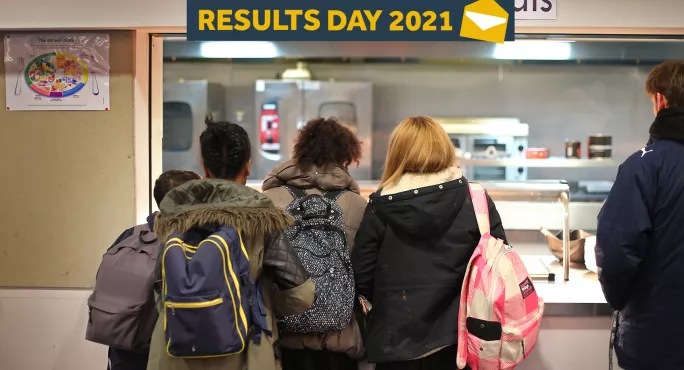A levels 2021: Rising disadvantage gap for poor pupils

The attainment gap between pupils on free school meals (FSM) and their peers has widened in the 2021 A-level results determined by teacher-assessed grades.
In a new analysis published this morning, Ofqual has measured how results compare between different student groups.
The regulator found that the majority of “between-group comparisons” showed “no notable change” in results from 2020 to 2021 or from 2019 to 2021.
A levels 2021:
- Results at a glance
- Third of teachers fear excess appeals
- Under 1% of teacher grades changed by boards
However, the report does reveal how the attainment gap for top grades at A level has increased for pupils on FSM, disadvantaged pupils and black pupils between 2019, before the pandemic, and today.
And it shows how the disadvantage gap for students on FSM achieving grade C and above at A level also widened this year.
The analysis indicates that the attainment gap for FSM pupils, black pupils, and those with “a very high level of deprivation” achieving a grade A or higher widened between 2019 and 2021.
Examining the “probability of grade A and above”, between 2019 and 2021, it states: “The longstanding gaps indicating lower outcomes of black candidates, FSM candidates, and candidates with a very high level of deprivation relative to their respective reference group, have widened by 1.43, 1.42 and 1.39 percentage points respectively.”
It also reveals that the attainment gap indicating lower outcomes for FSM pupils, compared to their peers, at Grade C and above rose by 1.14 percentage points between 2020 and 2021, and by 1.03 percentage points between 2019 and 2021.
Examining the “probability of grade C and above” for different groups between 2020 and 2021, the report says: “The gap indicating FSM candidates’ lower outcomes in 2020 relative to non-FSM candidates has widened by 1.14 percentage points in 2021.”
And for the same category between 2019 and 2021, it adds: “The longstanding gap indicating lower outcomes of FSM candidates relative to prior-attainment-matched non-FSM candidates has widened by 1.03 percentage points.”
However, the report concludes that, overall, “for A level, the majority of between-group comparisons examined in our modelling did not show notable changes from 2020 to 2021 or from 2019 to 2021”.
It states: “Using our method for evaluating changes between years and focusing on the results measures used in our analyses, we conclude that, of the many conditional results gaps examined in our modelling, the overwhelming majority showed no notable change from 2020 to 2021, and the majority showed no notable change from 2019 to 2021.
“Amidst no change on most gaps, the few changes noted could be understood as the impact of the pandemic on students’ education and the impact of the change in assessment arrangements. The two sources of impact are impossible to disentangle.”
The attainment gap between FSM pupils and their peers was only found to have widened in two out of three categories considered by Ofqual.
While the gap rose for both students achieving grade A and above and those achieving grade C and above between 2019 and 2021, there was “no notable change” when it came to their “mean numeric grade”, for either 2019-21 or 2020-21, the analysis found.
On mean numeric grades, it adds: “We found: all 22 between-group comparisons (on gender, ethnicity, language, SEND, FSM, deprivation, prior attainment) showed no notable change from 2020 to 2021 [and] 19 of the 22 between-group comparisons (on ethnicity, language, FSM, deprivation) showed no notable change from 2019 to 2021”.
Register with Tes and you can read two free articles every month plus you'll have access to our range of award-winning newsletters.
Keep reading with our special offer!
You’ve reached your limit of free articles this month.
- Unlimited access to all Tes magazine content
- Save your favourite articles and gift them to your colleagues
- Exclusive subscriber-only stories
- Over 200,000 archived articles
- Unlimited access to all Tes magazine content
- Save your favourite articles and gift them to your colleagues
- Exclusive subscriber-only stories
- Over 200,000 archived articles
topics in this article



